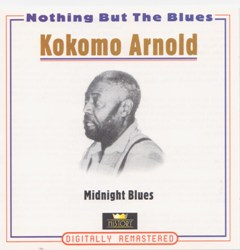Kokomo Arnold - Midnight Blues (2000)
Kokomo Arnold - Midnight Blues (1994)

CD1
1. Backfence Picket Blues [3:06]
2. Fool Man Blues [3:06]
3. Long and Tall [2:46]
4. Sally Dog [2:48] play
5. Cold Winter Blues [3:09]
6. Sister Jane Cross the Hall [2:39]
7. Wild Water Blues [3:13]
8. Laugh and Grin Blues [3:09]
9. Mean Old Twister [2:57]
10. Red Beans and Rice [3:03]
11. Set Down Gal [2:41]
12. Big Ship Blues [3:08]
13. Crying Blues [2:58] play
14. Grandpa Got Drunk [3:04]
15. Black Mattie [3:09]
CD2
1. Neck Bone Blues [2:51]
2. Buddie Brown Blues [2:53]
3. Rocky Road Blues [2:44]
4. Head Cuttin' Blues [2:54]
5. Broke Man Blues [2:53] play
6. Back on the Job [3:00]
7. Shine on, Moon [2:52]
8. Your Ways and Actions [2:46]
9. Tired of Runnin' From Door to Door [2:37]
10. My Well Is Dry [2:39]
11. Midnight Blues [2:49] play
12. Goin' Down in Galilee [2:28]
13. Bad Luck Blues [2:48]
14. Kid Man Blues [2:47]
15. Something's Hot [2:33]
Piano – Peetie Wheatstraw (tracks: 1-11, 1-12, 2-4 to 2-7) Vocals, Guitar – Kokomo Arnold
Kokomo Arnold (February 15, 1901 — November 8, 1968) was an American blues musician. Born as James Arnold in Lovejoy's Station, Georgia, he got his nickname in 1934 after releasing "Old Original Kokomo Blues" for the Decca label; it was a cover of the Scrapper Blackwell blues song about the city of Kokomo, Indiana. A left-handed slide guitarist, his intense slide style of playing and rapid-fire vocal style set him apart from his contemporaries.
Having learned the basics of the guitar from his cousin, John Wiggs, Arnold began playing in the early 1920s as a sideline while he worked as a farmhand in Buffalo, New York, and as a steelworker in Pittsburgh, Pennsylvania. In 1929 he moved to Chicago and set up a bootlegging business, an activity he continued throughout Prohibition. In 1930 Arnold moved south briefly, and made his first recordings, "Rainy Night Blues" and "Paddlin' Madeline Blues", under the name Gitfiddle Jim for the Victor label in Memphis. He soon moved back to Chicago, although he was forced to make a living as a musician after Prohibition ended in 1933. Kansas Joe McCoy heard him and introduced him to Mayo Williams who was producing records for Decca.
From his first recording for Decca on September 10, 1934, until his last on May 12, 1938, Arnold made 88 sides, seven of which remain lost. Arnold, Peetie Wheatstraw and Bumble Bee Slim were dominant figures in Chicago blues circles of that time. Peetie Wheatstraw & Arnold in particular were also major influences upon musical contemporary seminal delta blues artist Robert Johnson and thus modern music as a whole. Johnson turned "Old Original Kokomo Blues" into "Sweet Home Chicago", "Milk Cow Blues" into "Milkcow's Calf Blues", while another Arnold song, "Sagefield Woman Blues", introduced the terminology "dust my broom", which Johnson used as a song title himself.
Arnold's "Milk Cow Blues" was covered by Elvis Presley (as "Milk Cow Blues Boogie") at the Sun Studios produced by Sam Phillips and was issued as one of his early singles, it was later performed by Tyler Hilton who played Elvis in the 2005 film Walk the Line. Aerosmith covered "Milk Cow Blues" on their 1977 album Draw the Line, Dead Moon covered it on their 1990 album Defiance, George Strait on his 1991 album Chill of an Early Fall and Willie Nelson on the 2000 album Milk Cow Blues.
In 1938 Arnold left the music industry and began to work in a Chicago factory. Rediscovered by blues researchers in 1962, he showed no enthusiasm for returning to music to take advantage of the new explosion of interest in the blues among young white audiences. He died of a heart attack in Chicago, aged 67, in 1968, and was buried in the Burr Oak Cemetery in Alsip, Illinois.
download (mp3 @256 kbs):
yandex mediafire ulozto solidfiles global-files
Zmieniony (Sobota, 27 Marzec 2021 15:23)








